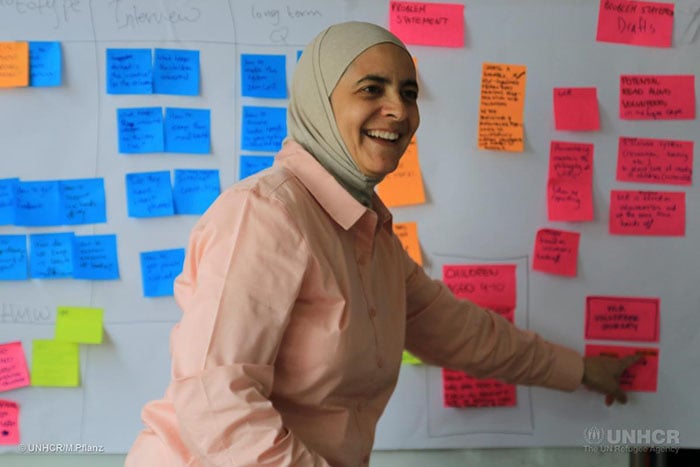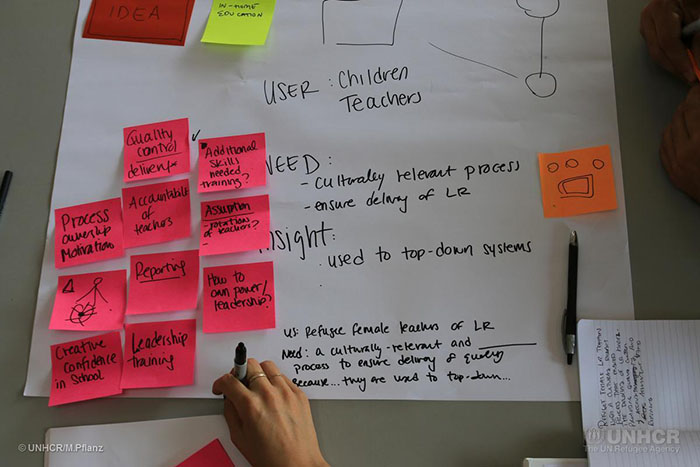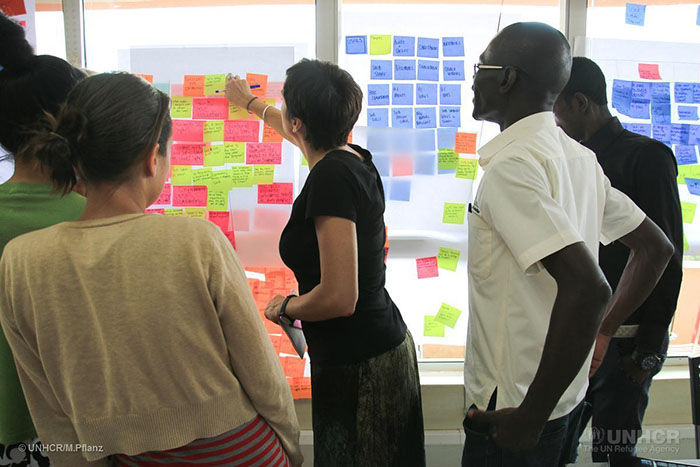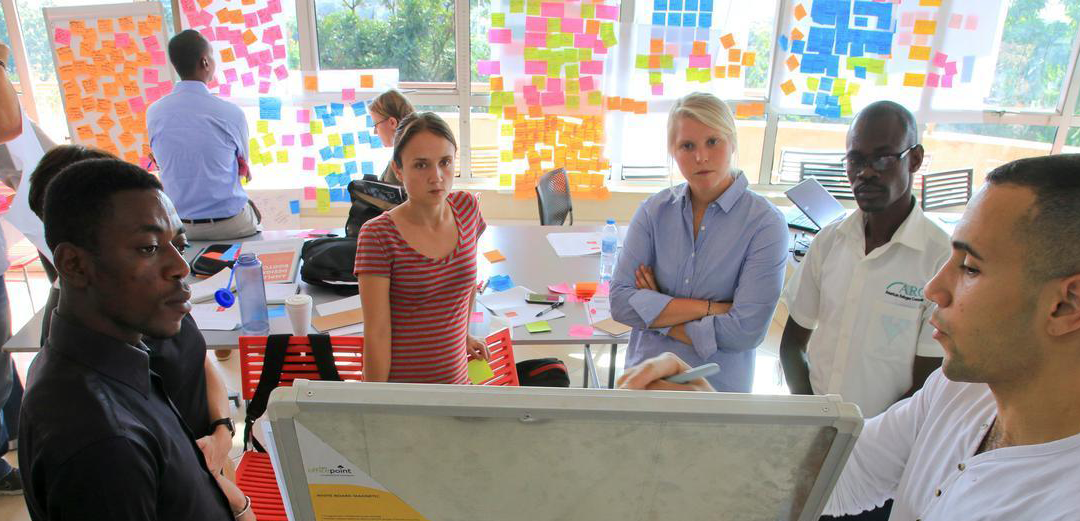It is the third day of the Refugee Education Challenge Bootcamp here on the fourth floor of a Kampala office block, and the usually magnificent view of the city’s hills is obscured by Post-It notes stuck to the windows scrawled with yesterday’s exercises.
Large notepads litter the tables, hand-drawn with process flows, stick figures, mind maps, and word associations. At each desk huddle teams of education specialists from North America, Africa and the Middle East. Alongside them, directing things, are a handful of Silicon Valley design innovators.
This unique gathering is part of a global competition called Amplify that is supported with expert guidance from UNHCR and UNICEF, and funded by Britain’s Department for International Development.
It used an open online platform to gather thousands of clever ideas from small development organisations about how to improve education for refugees, and then filtered them with crowd-sourced feedback to a small number of finalists.
They have then been brought together with IDEO.org, the non-profit arm of a long-established San Francisco firm that helped design the first laptop and Apple’s first mouse. The idea is for the design specialists to help the grass-roots organisations really map out and test their concepts, to ensure they have the best chance of success.
These seven teams are the finalists, and this four-day Amplify Design Bootcamp in the Ugandan capital will refine their ideas – ‘prototype’ them, to use the design terminology – to the point where they can attract funding and be implemented. UNHCR plans to put some of the best into practice.
At Bootcamp, there are buzzwords, and ‘blue-sky thinking’, and calls to ‘interrogate assumptions’. There are no failures, only opportunities to learn, the teams are told. Ideas must be “experienced by being made tangible”, so “we might come to know what we did not know that we did not know”.

Rana Dajani, Director of We Love Reading, brainstorms ideas during the Amplify Refugee Education Challenge design bootcamp.
“Honestly, last night I went back to the hotel and spoke with my partner, and we were pretty confused,” said Jessica Brown of Heshima Kenya, which works economically to empower refugee women. “It’s hard to break everything down and go way back to the beginning of your idea, and really start over while questioning everything.
“Then we slept on it. This morning at breakfast we were both like, ‘Wow, I get it now, I see what they are trying to tell us’.”
For Rana Dajani, the Jordanian founder and director of We Love Reading, which joins groups of refugee children with volunteer adults who read aloud to them, even just the ‘start from the start’ approach of the competition was inspiring.
“I spend my life filling out grant forms trying to make my idea fit with what a donor wants,” she said at lunch one afternoon. “Then these guys come along and just say, ‘Tell us how it works and how can we help’.
“I honestly think it’s the first time in all the years that I’ve been doing this that I have been able just to show the undiluted essence of the concept, and to work to refine that. It’s fantastic.”
Mary Hanlon, UNHCR’s Associate Education Advisor for Uganda, who brought expert input to the Bootcamp, said that the chosen finalists’ innovations fall into two broad themes: teacher engagement, and extra-curricular activities.
As well as Heshima Kenya and We Love Reading, the finalists are Soccer Without Borders and Right To Play, separate organisations using sports to encourage refugee children to participate in learning and life-skills; Little Ripples Ponds, which helps refugee women run pre-school education for traumatised refugee children; Yarid, which aims to smooth refugee children’s integration into mainstream schooling; and Finn Church Aid, which with Teachers College, Columbia University, focuses on the professional development of refugee teachers.

Finalists in the UNHCR-supported Amplify Refugee Education Challenge brainstorm ideas during their Bootcamp.
“They’re not reinventing the wheel,” said Hanlon. “They’re looking at what’s needed for children to be able to perform well in school, and these innovations actually all build on good work already being done. What is interesting is how similar the ideas are, which shows how many of the challenges faced in accessing quality education and learning, are shared among refugees wherever they are.
“These are the things that those of us who have never had to run for our lives forget; when there is upheaval in your life, the pattern of learning that might very naturally take place as you progress through your life can suddenly go missing. It can be very difficult to make that up without concerted effort by other people, be it your parents, be it your community, or be it a humanitarian agency.”
That effort can be accelerated with innovation, but institutions with established practices can be slow to recognise the value of fresh approaches, said Shauna Carey, who leads IDEO.org’s engagement with the Amplify competition and who directed the Bootcamp alongside her colleagues.
“In this room are incredibly smart people working on seemingly intractable issues, they are the real experts here,” she said. “But there are huge barriers in getting from their strong intuitions and good ideas, to a real proof of concept, especially to organisations of this size.

A team of design innovators from Silicon Valley guided finalists in a UNHCR-backed competition to address refugee education challenges.
“We’re here to help accelerating their rate of learning, sharing our methodology in service of them taking the next tangible step.”
IDEO.org, UNHCR, UNICEF, and DFID are all on hand to continue to lend support to each of the finalist teams as they return home from the Kampala Bootcamp with ideas how to prototype and test their innovations over the coming months.
Each has already won $10,000 to help with that process. In due course, a handful will progress to the next stage of the Amplify competition, where their ideas will be put into practice actually to start improving refugees’ education.
“You turn on the news, and everything you see for now suggests that stuff to do with refugee emergencies is hopeless, or there are a lot reasons to be pessimistic, or to think these things are completely intractable,” Carey says.
“But look at the combination of what these organisations have brought this week, and everyone’s collaboration, and how UNHCR, UNICEF, and DFID taking a bet on this, and you can see that there is real hope backed up with tangible action in this room.”
About the author:
Mike is a British journalist based in Kenya since 2004 who’s reported from most of the continent’s humanitarian crises for British and American newspapers. He began working with UNCHR in November 2014, focused on the South Sudan situation. He lives in Nairobi.
We’re always looking for great stories, ideas, and opinions on innovations that are led by or create impact for refugees. If you have one to share with us send us an email at [email protected]
If you’d like to repost this article on your website, please see our reposting policy.

